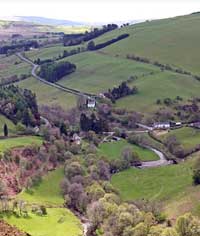Welsh upland unrest likely over Glastir impact on common land

Wales’ upland farming communities could face severe disruption when the new Glastir environmental management scheme comes into force, according to the Farmers Union of Wales common land committee.
Committee chairman Lorraine Howells said that Glastir represented one of the biggest changes in 50 years for upland communities.
She said she had major concerns about the practicality of commoner and graziers’ associations including their commons in the scheme.
But she reckoned that failure to enter the scheme would have severe financial implications for some local economies.
According to Miss Howells the vast majority of common land – about 8% of Wales’s total land area – is classified as less favoured, while 18% of Welsh farmers declare common land on their Single Application Forms.
“In some areas, communities are almost entirely reliant on their common grazing rights,” she said.
“Recognition of the specific handicaps faced on such land, and the risk of land abandonment and rural depopulation, led to the Hill Farming Act being passed in the immediate post-war period, and has effectively meant support for these areas since the introduction of the 1947 Agricultural Act.
“However, the introduction of the Glastir scheme represents the abandonment of such payments.”
She said the EU rules associated with agri-environmental schemes were far more restrictive than those that apply to less favoured area payments and created inherent difficulties for common land because they did not properly take into account the unique nature of common land management in the UK.
While there might be commons where the majority agree to sign up to Glastir, this majority would have to be 80% to meet criteria set by WAG and the EU Commission.
“Even if more than 80% do agree to participate, many feel that they will still not take the risk of entering the scheme and incurring penalties as a result of the actions of the minority who decide they wish to continue exercising their full legal rights to graze an individual common,” said Miss Howells.
The FUW wants to see the existing Tir Mynydd scheme continued with changes made over a prolonged period.
A Welsh Assembly Government Spokesman said:
“The Welsh Assembly Government recognises the importance of common land to the environment and to the viability of many farms in Wales. We have been working with a wide-range of stakeholders in the Glastir Commons Working Group over many months to ensure that common land can be brought into Glastir, Wales’s new sustainable land management scheme.
“Under European Commission regulations, agri-environment schemes such as Glastir provide compensation for the delivery of environmental outcomes, not income support, which is provided through the Single Payment Scheme.
“Some commoners may decide that entering Glastir would not be the right decision for their business. That is a decision for each business to make – the scheme is entirely voluntary. The budgetary allocation for Glastir remains at the same level as that of the current agri-environment schemes, so the same amount of money will enter the rural economy.
“In addition, to the establishment of the Glastir Commons Working Group, which has provided valuable input on the practicalities of implementing Glastir on common land, we will be providing funding for 18 Commons Development Officers, who will be in post later this year and will work to support the development of grazing associations, necessary to enable a Glastir Commons element contract to be put in place.”
